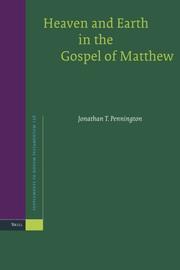| Listing 1 - 2 of 2 |
Sort by
|

ISBN: 1282196162 9786612196164 3110204169 9783110204162 9783110193435 3110193434 Year: 2007 Publisher: Berlin ; New York : Walter de Gruyter,
Abstract | Keywords | Export | Availability | Bookmark
 Loading...
Loading...Choose an application
- Reference Manager
- EndNote
- RefWorks (Direct export to RefWorks)
In two places in the First Gospel (Matt 10:5b-6; 15:24) the Messianic mission of Jesus and his disciples is limited to a group called 'the lost sheep of the house of Israel'. In light of Matthew's intense interest in Jesus' Davidic Messiahship and the Jewish Shepard-King traditions surrounding King David it is argued that the 'lost sheep of the house of Israel'refers to remnants of the former northern kingdom of Israel who continued to reside in the northern region of the ideal Land of Israel.
Messiah --- Shepherds in the Bible. --- Israel (Christian theology) --- Biblical teaching. --- Bible. --- Evangelie volgens Matteus --- Evangelie volgens Matthéüs --- Matʻae pogŭm --- Matai den --- Matai ni yoru fukuinsho --- Matius (Book of the New Testament) --- Mattá --- Matteo (Book of the New Testament) --- Matteus --- Matthäusevangelium --- Matthéüs --- Matthew (Book of the New Testament) --- Matthieu (Book of the New Testament) --- Criticism, interpretation, etc. --- Mattheüs (bijbelboek) --- Messias. --- New Testament.

ISSN: 01679732 ISBN: 9789004162051 1281936677 9786611936679 9047421841 9789047421849 9004162054 Year: 2007 Volume: 126 Publisher: Leiden ; Boston : Brill,
Abstract | Keywords | Export | Availability | Bookmark
 Loading...
Loading...Choose an application
- Reference Manager
- EndNote
- RefWorks (Direct export to RefWorks)
A much-overlooked aspect of the Gospel of Matthew is the theme of heaven and earth. Rather than being a reverential circumlocution for God, ‘heaven’ in Matthew is part of a highly developed discourse of heaven and earth language. Matthew’s idiolectic way of using heaven language consists of four aspects: 1) a distinction in meaning between singular and plural forms of ouranos ; 2) frequent use of the heaven and earth word pair; 3) regular reference to the Father in heaven; and 4) the recurrent use of the Matthean expression, kingdom of heaven. This book examines the historical precedents for each of these aspects and shows in Matthew how they serve one overriding theological purpose: to highlight the tension that currently exists between heaven and earth or God and humanity, while looking forward to its eschatological resolution.
Bible NT. Gospels. Matthew --- Bible. --- Heaven --- Earth (Planet) --- Ciel --- Terre --- Biblical teaching. --- Biblical teaching --- Enseignement biblique --- Criticism, interpretation, etc. --- Earth --- 226.2 --- Evangelie volgens Matteüs --- Evangelie volgens Matteus --- Evangelie volgens Matthéüs --- Matʻae pogŭm --- Matai den --- Matai ni yoru fukuinsho --- Matius (Book of the New Testament) --- Mattá --- Matteo (Book of the New Testament) --- Matteus --- Matthäusevangelium --- Matthéüs --- Matthew (Book of the New Testament) --- Matthieu (Book of the New Testament) --- Aspect religieux --- Hemel. --- Idiolect. --- Mattheüs (bijbelboek) --- Heaven - Biblical teaching. --- Earth - Biblical teaching.
| Listing 1 - 2 of 2 |
Sort by
|

 Search
Search Feedback
Feedback About
About Help
Help News
News